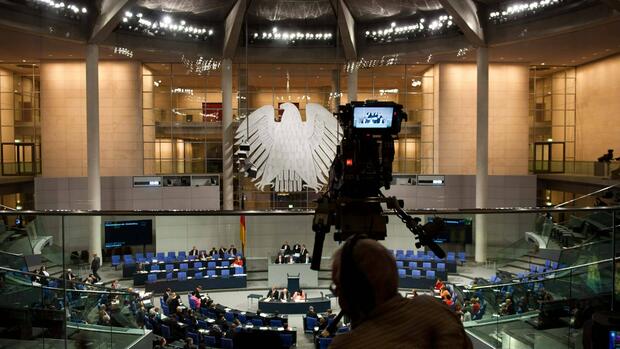The law was passed by the Bundestag in March with the votes of the traffic light groups SPD, Greens, FDP and some AfD MPs.
(Photo: imago/Uwe Steinert)
Berlin The controversial electoral law reform to reduce the size of the Bundestag can come into force. Federal President Frank-Walter Steinmeier signed the law on this. The Office of the Federal President announced this on Thursday in Berlin. The law now only has to be published in the Federal Law Gazette. However, it is already clear that it will be reviewed by the Federal Constitutional Court.
The CSU-led Bavarian state government has already decided to sue in Karlsruhe. And the CDU/CSU parliamentary group wants to have the constitutionality checked with an abstract legal review action. The Union, but also the left feels disadvantaged by the reform and does not consider it compatible with the Basic Law.
The law was passed by the Bundestag in March with the votes of the traffic light groups SPD, Greens, FDP and some AfD MPs. It passed the Federal Council in May. It was then subjected to the usual legal examination in the Office of the Federal President.
With currently 736 members, the Bundestag is the largest freely elected parliament in the world. The new electoral law now caps the number of seats at 630. Elections will continue to be made with a first and second vote.
However, there are no longer any surplus or compensation mandates. The strength of a party in parliament is solely determined by the number of second votes it receives. So far, overhang mandates have arisen when a party has won more seats in the Bundestag via direct mandates than it was entitled to based on the result of the second vote. She was allowed to keep this. The other parties received compensatory mandates in return. This system led to an ever-increasing inflation of the Bundestag.
How it will look in the future
The basic mandate clause is now also omitted. According to her, parties have also entered the Bundestag with the strength of their second vote result if they were below the five percent hurdle but won at least three direct mandates.
The law now only has to be published in the Federal Law Gazette. However, it is already clear that it will be reviewed by the Federal Constitutional Court.
(Photo: IMAGO/Nordphoto)
Every party that wants to get into the Bundestag must get at least five percent of the second votes nationwide. With one small exception: parties of national minorities remain exempt from this.
In the future, each party will only receive as many mandates as it is entitled to based on its second vote result – even if it wins more direct mandates. Then the constituency winners with the worst first vote result go away empty-handed. This is criticized above all by the CDU and the CSU. The fact that the basic mandate clause is no longer enraged not only the CSU but also the left.
If the CSU had not won 5.2 percent nationwide in the 2021 federal election, but only 4.9 like the left, none of their 45 successful direct candidates would have gotten into the Bundestag under the new electoral law. The left, which benefited from the basic mandate clause, would also be out. Both parties see this as a gross disregard for the will of the electorate.
The left had appealed to Steinmeier not to draft the law. Vain. Before signing, the Federal President always checks whether a law has been passed in accordance with the rules of the Basic Law. According to the general opinion, however, he also has a substantive right of examination and can refuse to sign if he is of the opinion that the content of a law is not compatible with the Basic Law.
This has happened eight times in the history of the Federal Republic. The last two cases were in 2006, when Federal President Horst Koehler first did not sign the law on the privatization of air traffic control and later the consumer protection law.
More: Electoral law reform happens Federal Council – constitutional complaint announced
